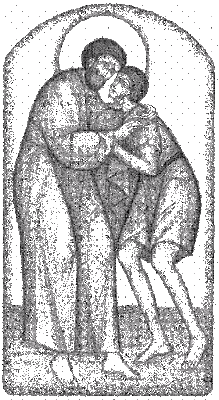XXVI SUNDAY IN ORDINARY TIME - Lk 16:19-31
In this Sunday’s gospel, we are told the well-known parable of the rich man and the poor Lazarus. In the parable, we are told nothing about the moral behaviour of both the rich man and the wretched one. Were they law-abiding people? Were they fair in their dealings with other people? Were they truthful? It seems as if none of these was a deciding factor in their final fate. We remain with the impression that Lazarus got a time of happiness and peace, just because of the wretchedness he lived in here on earth, while the rich man saw his happiness changed into sorrow and suffering. We know nothing about the source of the rich man’s wealth. Did he inherit it? Did he get rich by his hard work and entrepreneurship? Or was it the fruit of his crookedness and his exploitation of the poor? And the same applies to the poor Lazarus. Was he born poor or did he become poor because he wasted his wealth? Was he lazy or maybe an alcoholic and addicted to drugs? We know nothing about their honour and honesty. We may say that this parable is an illustration of the beatitudes as they are presented in the gospel of Luke: “Blessed are you who are poor, for yours is the kingdom of God” and its counterpart: “But woe to you who are rich, for you have received your consolation” (Lk 6:21,24).
In spite of this unclear picture about the moral behaviour of both of them, Jesus leaves it clear about the true reason of the rich man’s condemnation: He “used to dress in purple and fine linen and feast magnificently every day”. He only cared about enjoying life, trying to get the most pleasure his wealth bought for him. He had no other concerns and he was blind to everything else. He was unable to feel compassion for the suffering of the others and the poor Lazarus at the gate of his palace was a nuisance that his servants were ordered to hide from him. He never listened to the cry of the poor, because he was too full of himself. The parable leaves the clear impression that the rich man had much more that he deserved and that the poor Lazarus was unjustly ignored and despised, being treated as an outcast.
In the second part of the parable, there is an inversion of the situation, with poor Lazarus being welcomed in paradise, while the rich man finds himself in a place of suffering. And it is as if the suffering opened up his eyes and he realised the dear situation he was in. He complains about his suffering and seeks relief from the one he had ignored and despised. However, his request was rejected, first of all, because there is a huge gap - a canyon - that separates those who have entered God's house and those who have been excluded from it. And suddenly we are surprised that this selfish man thinks about his brothers and cares about their fate. And he asks for the unthinkable. Lazarus could go back, as someone who rose from the dead, to warn them. However, he is told that they would not believe a resurrected Lazarus; instead, they would consider him to be a ghost. For them and for us, there is only one way to avoid condemnation and to find a place in God’s Kingdom: “They have Moses and the prophets, let them listen to them.” Only listening to the word of God can lead us to conversion.


